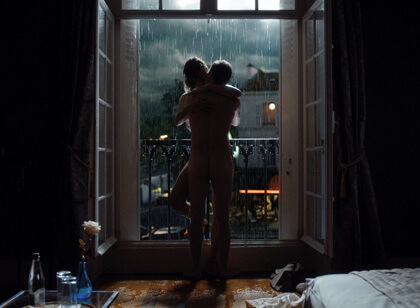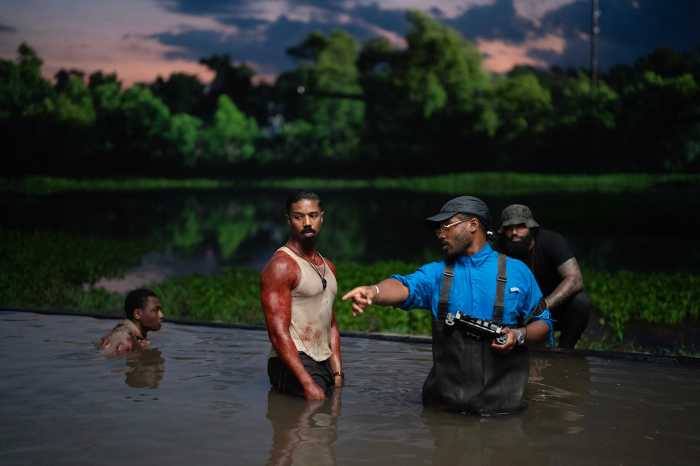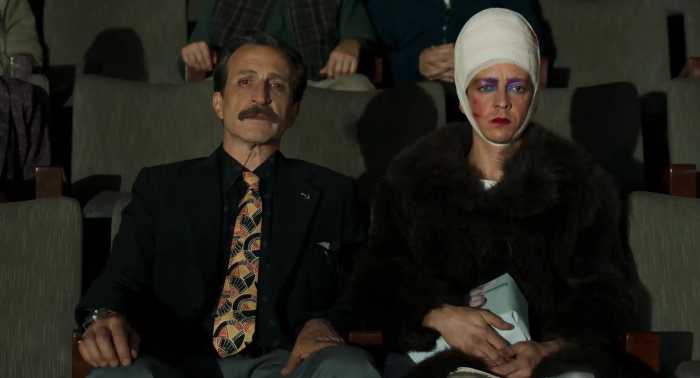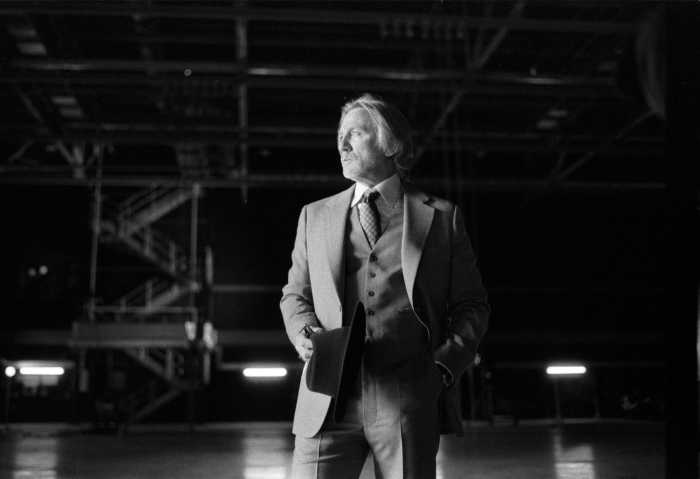Mathieu Amalric and Stéphanie Cléau in Amalric’s “The Blue Room,” adapted from the Georges Simenon novel of the same name. | SUNDANCE SELECTS
BY GARY M. KRAMER | The title of director Mathieu Amalric’s compelling adaptation of the Georges Simenon novel “The Blue Room” refers to both the hotel where Julien (Amalric) and Esther (Stéphanie Cléau) engage in extramarital assignations and the courtroom where the pair are on trial for the murder of their spouses.
Unfolding in a flashback/ forward style, “The Blue Room” allows viewers to look at the facts from all angles until the characters’ fates are decided. The storytelling is canny, with clues perhaps having deeper meanings or maybe being just deceptive distractions. When Esther makes a comment to Julien as he stands naked by the hotel room window, does he really hear her or is he oblivious because he is watching her husband, Nicolas (Olivier Mauvezin), walk toward the hotel? When this moment is presented early in the film, audiences may read it one way. When the incident is recounted later, in a police station, another interpretation is possible. Life is different when you live it versus when you go back over its details in your memory, Julien says. Conversations as well as letters sent and received come back to haunt the characters.
Amalric’s opening scenes are a precise series a shots — a hallway, a wall, bed sheets, and blood, all seen against a soundtrack of erotic pleasure. Fragments of naked bodies—a fly on Esther’s navel and a bite of Julien’s lip — and the question, “Would you spend your whole life with me?,” give way to scenes of an investigation. We learn that Julien and Esther have met eight times in 11 months. Were they conspiring to kill their spouses?
Mathieu Amalric’s taut drama explores how thoroughly two lovers have betrayed their spouses
“The Blue Room” unpeels its layers carefully. Julien’s tenderness with Esther is contrasted with tense moments between him and his wife, Delphine (Léa Drucker). When Julien and Esther share illicit moments in bed in the blue room, there is an erotic charge to the couple’s sweaty, naked bodies. In Julien and Delphine’s bedroom, there is a palpable frostiness as the couple settles down for bed. At the beach, Delphine playfully splashes and dunks Julien, but his reaction seems almost menacing. Perhaps he hates her — but does he really want to kill her? Or is the scene a red herring? Amalric teases out the answers in a dramatic, talky last act where the evidence is reviewed in the courtroom.
The deaths of Nicholas and Delphine are suspicious, but they happen off-screen. (There is a terrific bit in which Delphine’s death is revealed through a series of police photos). This narrative approach encourages viewers to consider whether they are sympathetic to the lovers, who are mere victims of circumstance, or they believe the adulterers are instead cold-hearted killers.
Amalric, as director, tries not to tip his hand, but a drop of blood-red plum jam on a computer and a shot of Delphine seen from a car’s side view mirror provide nice visual touches. The filmmaker also uses dark brooding music when Julien and Delphine are on their beach holiday. But, again, the viewer will wonder whether they are reading too much into these details.
The performances are so poker-faced, audiences will likely grasp onto any clues in their path. Amalric is fantastic as Julien. His blank expressions belie the intense concentration he brings to processing the unfolding situation. When Julien reacts to an anonymous card he receives in a pharmacy, it’s unclear whether the look on his face is one of guilt or he is simply stunned. In the hotel room, the play of light and shadow on his face and naked body suggest desire — but also evil.
Cléau, though not as prominent in the film as Amalric, also makes a strong impression. Signs of Esther — a red towel, those anonymous cards — crop up from time to time, reminding Julien of her, as though he could ever forget his passionate attachment to her.
Some may find “The Blue Room” has an unnecessary artiness or staginess about it — with its portentous symbols or Julien’s goatee changing into a beard or a clean shaven chin to demarcate time. But this is a forceful and concise drama that is testimony to Amalric’s talents both in front of and behind the camera.
THE BLUE ROOM | Directed by Mathieu Amalric | Sundance Selects | Opens Oct. 3 | IFC Center, 323 Sixth Ave. at W. Third St. | ifccenter.com




































